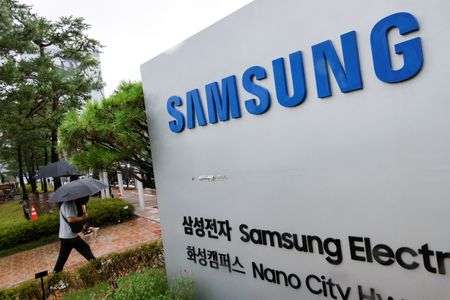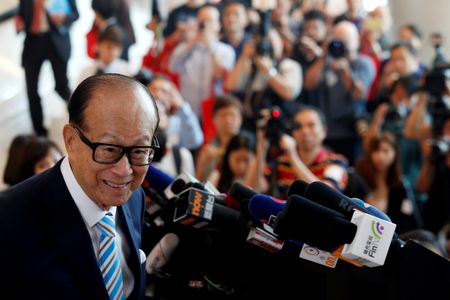By Heekyong Yang and Ju-min Park
SEOUL (Reuters) -Samsung Electronics’ biggest workers’ union in South Korea said on Wednesday it will continue a strike indefinitely, stepping up its campaign against the tech giant for better pay and benefits.
The National Samsung Electronics Union (NSEU), whose roughly 30,000 members make up almost a quarter of the company’s South Korean workforce, said it has decided to indefinitely extend the strike that started on Monday because management had shown no indication of holding talks.
The strike was initially planned to last three days through Wednesday.
It adds to challenges for the world’s biggest memory chipmaker which is struggling to navigate competition in semiconductors used for artificial intelligence (AI) applications.
Union officials said 6,500 workers had participated in the strike, and they urged more members to join.
“It is time that we need power and help from our fellow members,” Lee Hyun-kuk, the union’s vice president, said in a YouTube live broadcast.
“Really our objective is to stop (chip production) lines,” he said.
Lee told Reuters the strike had disrupted production on certain chip lines, with equipment running more slowly.
Samsung said the strike had caused no disruption during the first three days.
“Samsung Electronics will ensure no disruptions occur in the production lines. The company remains committed to engaging in good faith negotiations with the union,” it said in a statement.
Samsung’s share price closed up 0.1% on Wednesday, while the benchmark KOSPI index was little changed.
ADVERTISING CAMPAIGNS
To boost participation, the union said it plans to hold advertising campaigns at cafeterias inside chipmaking plants producing 8-inch wafers and high bandwidth memory (HBM) chips that are in high demand for use in AI processors.
Union officials have disputed media reports of low participation, telling Reuters that the five-year-old body did not have enough time to educate members about the labour issues. The union held training sessions on Tuesday and Wednesday.
The officials also said a former union leader at Hyundai Motor, an auto giant with 60% of workers in South Korea unionised, was sharing history and experience of their strikes.
Hyundai and its South Korean union reached a tentative wage deal this week, potentially avoiding a strike.
Analysts said it would be difficult to verify whether the strike has disrupted Samsung’s production unless the union provides details of wafers and processes impacted.
The union said it has revised demands to include a 3.5% increase in base salary and, instead of an extra day’s annual leave, a day off to mark the union’s founding. Lee said the management previously offered a 3% rise in base salary but the union wants more to better reflect inflation.
It also wants equality in the bonus system between rank-and-file workers and executives.
Lee Kyungmook, a business professor at Seoul National University, said the union’s strike might not get broad support among workers because there’s little incentive left for them as any disruption would directly impact their wages.
“If their company can’t make money because production lines aren’t operating, the amount of bonus will be significantly cut. Then the strike won’t be able to gain momentum,” Lee said.
(Reporting by Hyunsu Yim, Heekyong Yang and Ju-min Park; Editing by Christopher Cushing, Kim Coghill and Muralikumar Anantharaman)













